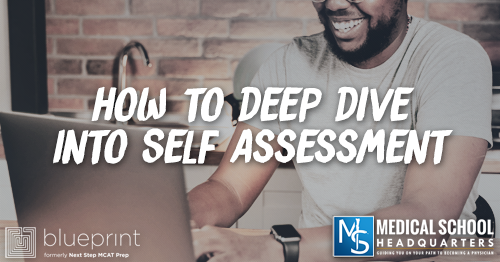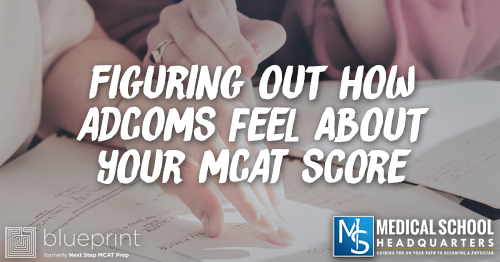Apple Podcasts | Google Podcasts
Session 325
Are you wondering how your practice test translates to the real test? That’s always the big question. Today, we discuss the importance of practice exams and how that factors into your MCAT readiness.
We’re joined by Noor from Blueprint MCAT. If you would like to follow along on YouTube, go to premed.tv.
Listen to this podcast episode with the player above, or keep reading for the highlights and takeaway points.
The Importance of Starting with Full-Length Exams
- Noor emphasizes the importance of starting with full-length exams, even if students may feel discouraged by their initial scores. She encourages students not to judge their abilities based on early results, as they are still in the early stages of studying.
- With Blueprint MCAT’s structured content review, students have only covered 25% of the material. Hence, it’s crucial to continue with full-length exams to gauge progress accurately.
-
Start with your full-length exams early in your preparation.
- Starting with full-length exams early on in your MCAT preparation is crucial. While the scores you receive on these initial exams should not be taken as definitive, they provide valuable insights into your strengths and weaknesses. It’s essential to understand that these scores do not determine your final outcome.
- Some students may see improvements from their diagnostic exam, only to experience a temporary decline in their second full-length. It’s important to interpret these scores as indicators of areas that need improvement rather than definitive judgments.
-
Take multiple full-length exams.
- Noor advises students to take seven to ten full-length exams before their final MCAT exam. This recommendation allows ample opportunity to practice and refine your skills. Each full-length exam exposes you to new material and provides insight into areas that require further attention.
- Approach the scores as a guide for improvement rather than fixed results. This way you can focus on honing your skills and addressing weaknesses to ultimately achieve your best performance on the MCAT.
-
The Significance of AAMC Practice Tests for MCAT Preparation
- Noor highlights the importance of AAMC practice tests as a reliable indicator of your MCAT performance. While Blueprint MCAT exams may be more challenging, they should not be seen as deflating scores. Rather, they provide a valuable opportunity to work with denser, more difficult material. However, the truest predictor of your scores lies in the AAMC practice tests.
-
- The AAMC exams are written by the same people who create the actual MCAT, hence, they serve as the gold standard. It is recommended to save these practice tests for the final stages of preparation, after completing content review.
- Many students have seen notable improvements and felt more confident when taking the AAMC exams, making them an essential component of MCAT readiness.
-
The Timing and Considerations of AAMC Practice Tests
-
Avoid waiting until the last few weeks.
- Students often experience anxiety about waiting until four or five weeks before their MCAT exam to take their first AAMC full-length test. There is a fear of receiving a lower score, which may lead them to consider rescheduling the exam. However, waiting until this late stage limits rescheduling options and may incur higher fees.
- It is advisable to take an AAMC test around two months before the exam to allow for more flexibility in rescheduling.
-
Insert an AAMC exam mid-study.
- It is possible to insert an AAMC exam into your study schedule to assess whether rescheduling is necessary. However, it is not recommended to take an AAMC exam at the beginning of your preparation, as you want to maximize the value of these exams later on.
- It is best to have a solid foundation of studying and practice, including other full-length exams, before taking an AAMC test. Keep in mind that while an early AAMC exam can provide an idea of where you stand, it may not be the most accurate predictor since you still have more practice and study ahead.
-
Evaluate your score gap.
- If you are within eight to ten points of your target score, you may take an AAMC exam in the middle of your study period to assess rescheduling. This is acceptable because you still have ample time to improve. However, if you are significantly far from your goal score, a different approach may be needed. It’s essential to gauge your progress and make decisions based on your individual circumstances and score gaps.
Understanding Trends and Setting Expectations
Analyzing Score Trends
When interpreting AAMC exam scores, it is crucial to look for trends rather than focusing on individual outliers. Students often fixate on the highest or lowest score and base their expectations on that single result. However, it is more accurate to observe whether there is a consistent increase or decrease in scores over time.
A gradual improvement signifies progress, while stagnant scores may indicate the need for more practice. It’s essential to consider the context of each exam and analyze why certain scores deviate from the trend.
Assessing Confidence in Target Scores
To have confidence in achieving a target score, instructors recommend that the last three exams before the MCAT should align closely with that goal. Merely having one random test score that matches the target while others are significantly lower can be unreliable. Achieving a consistent performance at or near the desired score range in the final stages of preparation provides a better indication of what to expect on the actual exam.
The availability of only five AAMC exams poses challenges in accurately assessing progress. Retaking these exams within a short period is not advisable due to potential bias from remembered information.
When You Haven’t Reached Your Goal Score
Additionally, the pressure surrounding the last few AAMC exams can be overwhelming, especially when students realize they are not achieving their desired scores. It is, therefore, important to keep in mind that fluctuations in performance can occur, and you may perform better on the actual exam than on practice tests.
However, if there is a significant gap of more than four or five points from your goal score, it may be necessary to reassess your approach. It is understandable that this decision can induce stress.
'You should be within four to five points of your goal score by the time you're done studying.'Click To TweetStudents must weigh their options. They could choose to proceed with the exam despite not reaching their goal score. Or they could extend their study time to address areas of struggle identified through AAMC exam analytics.
Often, these struggles are related more to strategy rather than content, as most students have completed the bulk of their content review by the time they reach the AAMC exams.
Can Your Score Improve Within a Month?
- The potential for score improvement within a month largely depends on the individual’s goal score. If the goal is an exceptionally high score, such as a 529, it may be challenging to achieve a significant increase within a month. However, if the goal is more modest, such as a 515 or 517, it is possible to see improvements within that timeframe.
-
Maximizing Your Score in One Month
- To maximize the chances of improvement within a month, Noor says it is crucial for students to analyze their weaknesses and target them efficiently. Simply studying without intentionality may not yield the desired results. Students should focus on identifying what is preventing them from reaching a higher score and address those specific areas.
- It’s important to note that everyone’s goal scores are different. Some students aim for a score of 510, while others aspire to achieve a perfect 528. The conversation and expectations will vary based on these individual goals.
-
Balancing Realism and Possibility
- Achieving a substantial increase in scores within a month may be more challenging and less feasible, particularly for extremely high targets like a 528. However, it’s worth noting that miracles can happen, and exceptional improvements are not impossible.
Recognizing the Impact of Burnout
-
Dealing with Score Fluctuations
- A recurring issue faced by many test-takers is score fluctuations. Two weeks or a week before their exam, one of Noor’s co-instructors took one of the AAMC exams and was disheartened to see a 10-point drop from their previous performance. Understandably, this outlier result momentarily shook their confidence.
- However, rather than fixating on this isolated setback, they wisely chose to evaluate their overall performance leading up to the exam. They looked at their performance in other AAMC exams and considered their progress over time. This broader perspective helped them gain a deeper understanding of the factors contributing to the unexpected score decrease.
-
The Importance of Prioritizing Your Mental Wellbeing
- Upon analyzing their performance, they discovered that the significant drop in scores could be attributed to burnout. The relentless pressure they had put on themselves to study intensively and constantly practice had taken a toll on their mental well-being. It became clear that pushing oneself to the extreme can have adverse effects on performance.
- Noor emphasizes that this serves as a reminder to future MCAT aspirants to consider their mental well-being throughout their preparation journey. Setting lofty goals, such as aiming for the 97th percentile, may seem tempting a month before the exam. However, it is crucial to avoid succumbing to the pressure and overloading oneself with excessive practice exams, which can lead to burnout.
Considering Financial Factors in MCAT Rescheduling
Financial considerations can significantly impact the decision-making process when it comes to rescheduling the MCAT exam. Assess the available options within the designated cut-off periods to ensure either a full refund or the opportunity to reschedule without financial implications.
If financial constraints are not a concern and money is not a deciding factor, evaluate your readiness for the exam approximately two weeks before the scheduled date. However, individual circumstances may vary, and it is essential to consider personal preferences and comfort levels with financial implications.
Links:
SEARCH SITE
SEARCH SITE
LISTEN FOR FREE












